Tools Required
J 7872 Magnetic Base
Dial Indicator
Caution: Wear safety glasses to avoid injury when using compressed air
or any cleaning solvent. Bodily injury may occur if fumes are inhaled or if
skin is exposed to chemicals.
- Clean the crankshaft with clean solvent using the following procedure:
| • | Do not scratch the bearing journals. |
| • | Blow all of the sludge from the oil passages with compressed air. |
| • | Remove the clutch pilot bearing located in the end of the crankshaft
(manual transmission only). |
- Wipe the crankshaft bearing inserts free of oil with a soft cloth.
- Inspect the crankshaft for cracks using the Magnaflux Spot-check
dye method or the equivalent.
- Inspect the crankshaft bearing journals and thrust surfaces for
the following conditions:
| • | Damage caused by lack of lubrication |
- Inspect the crankshaft bearing inserts and thrust surfaces for
the following conditions:
| • | Damage caused by lack of lubrication |
| • | The lower bearing inserts (except the front bearing) will show
greater wear and the most distress from fatigue. If the lower insert is worn
or damaged, replace both the upper and the lower inserts as a set. |
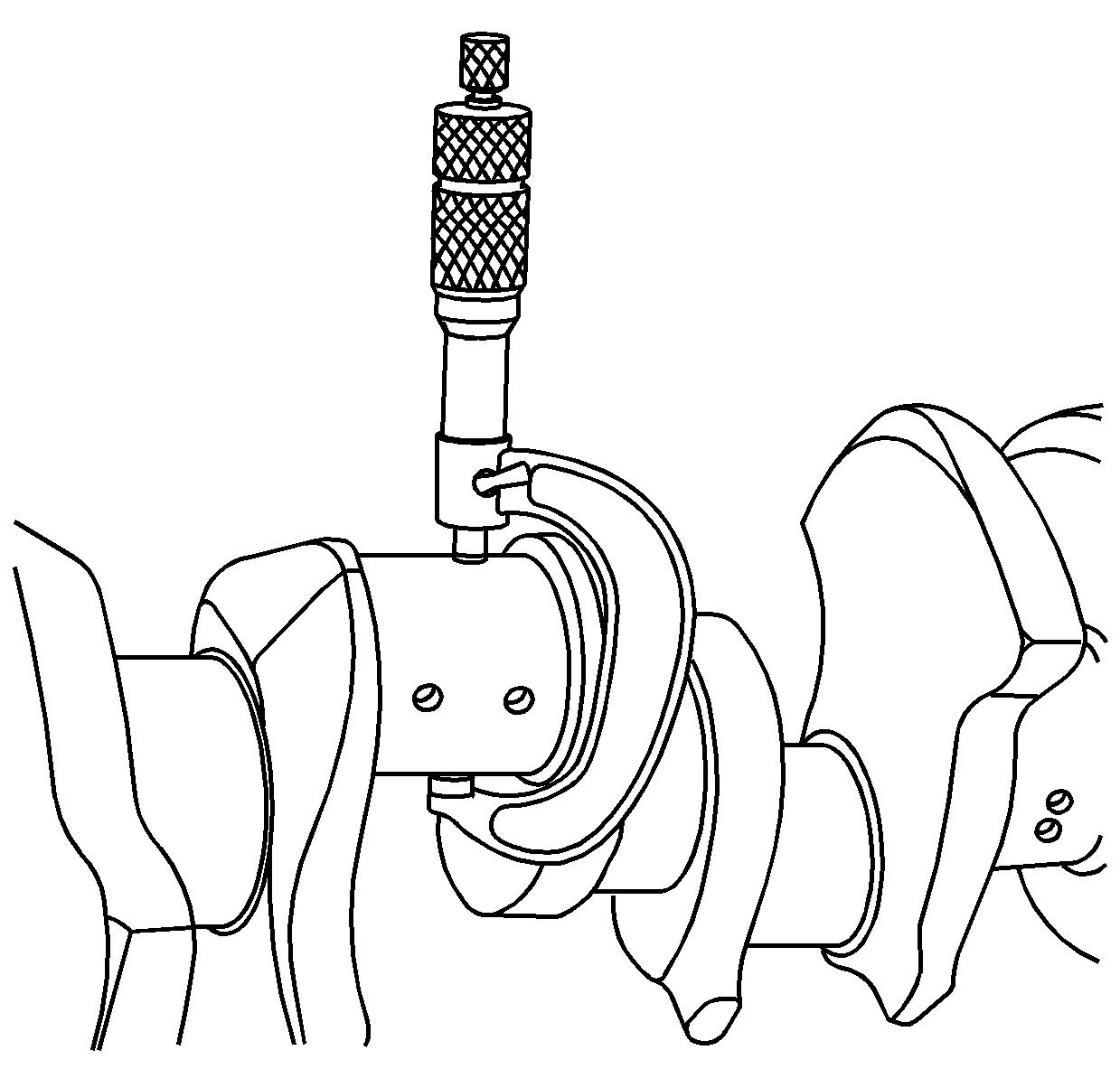
- Measure the crankshaft journal diameter with a micrometer in several
places, approximately 90 degrees apart. Average the measurements. Refer
to
Engine Mechanical Specifications
.
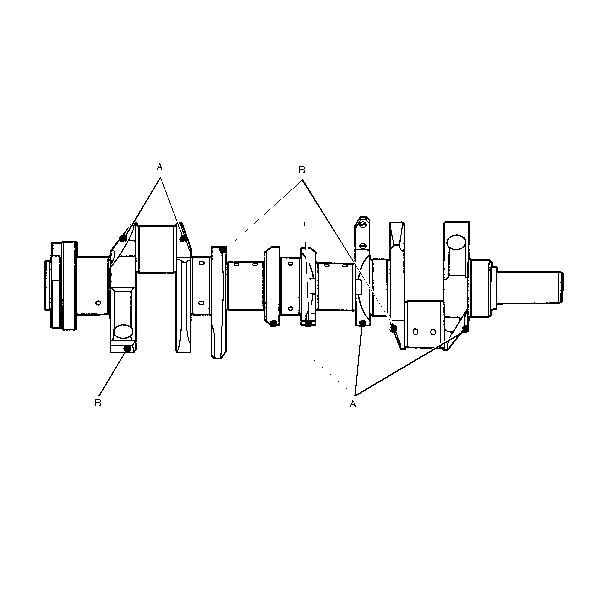
- The connecting rod and the crankshaft bearing journal sizes are color coded
with paint markings. Main bearing journal markings (A) are blue, orange/red,
or white. Rod bearing journal markings (B) are yellow or green.
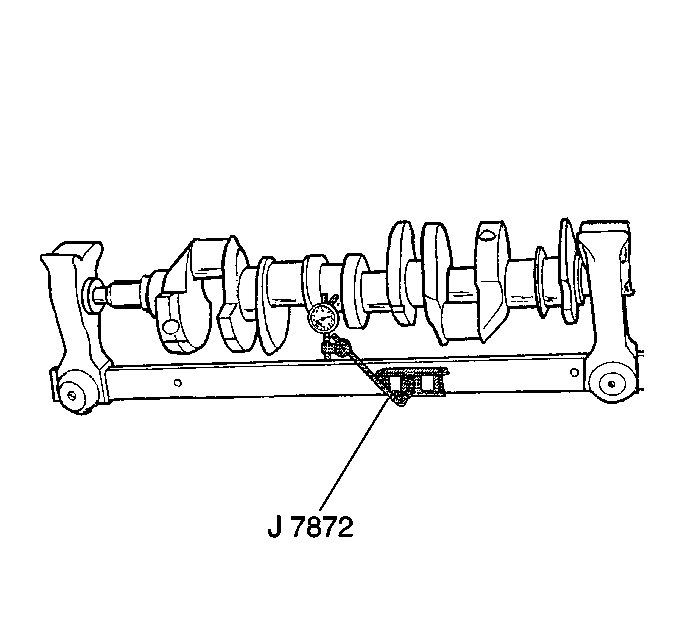
- Compute taper. Refer to
Engine Mechanical Specifications
. Replace the crankshaft if the measurement
exceeds specifications.
- Measure the crankshaft runout using the following procedure:
| 9.1. | Mount the crankshaft in V-blocks at crankshaft journals one and
five. |
| 9.2. | Use the J 7872
to
measure crankshaft runout. Replace the crankshaft bearings and the crankshaft
if the runout exceeds 0.01 mm (0.0004 in). |
Notice: The crankshaft bearing and the connecting rod journals are machined
with deep, rolled fillets for strength. Grinding the crankshaft may disturb
the fillets and weaken the crankshaft. Replace the crankshaft if it is damaged.
Notice: Perform TDC Offset Recovery procedure if the timing chain, timing gears,
engine front cover, crankshaft position sensor, crankshaft or
other components affecting the timing are replaced.
Notice: Do not shim, scrape, or file bearing inserts. Do not touch the bearing
surface of the insert with bare fingers. Skin oil and acids will etch the
bearing surface.

- Measure clearances using either the micrometer method or the plastic
gauging method.
- In order to measure clearances with the micrometer method, use
the following procedure:
- Install the crankshaft bearings into the crankshaft caps and engine
block.
- Install the crankshaft caps and bolts. Tighten all of the bolts.
Refer to
Engine Mechanical Specifications
.
- Measure the bearing inside diameter with any inside micrometer.
Place the micrometer at 90° to the split line of the crankshaft bearing.
- Subtract the journal diameter from the bearing inside diameter
in order to obtain the bearing clearance.
- Clearances for crankshaft bearing numbers one, two, three, and
four are 0.045-0.083 mm (0.0018-0.0033 in).
- Clearances for crankshaft bearing number five are 0.055-0.093 mm
(0.0022-0.0037 in).
- If bearing clearances exceeds specifications, install new crankshaft
bearings.
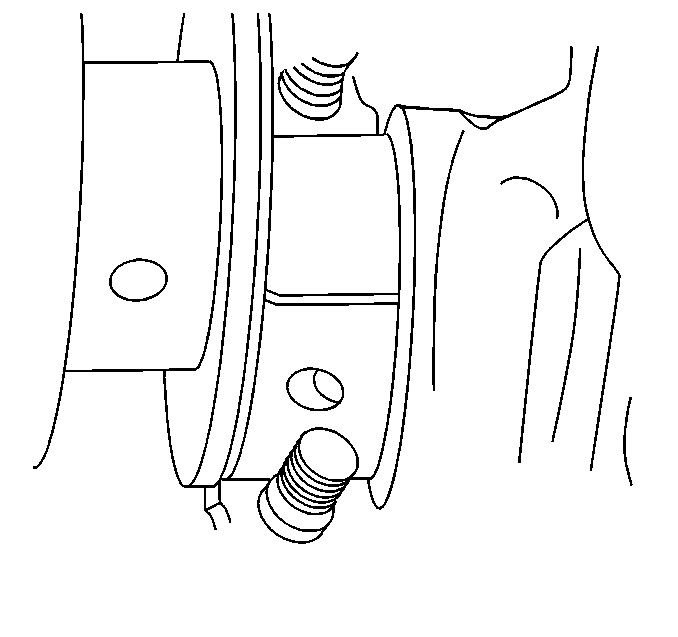
- In order to measure clearances with the plastic gauging method, use
the following procedure:
- Install all lower crankshaft bearings and the crankshaft into
the block.
- Place the gauging plastic across each crankshaft journal.
- Install all upper crankshaft bearings and bearing caps into the
block. Torque all bolts. Refer to
Engine Mechanical Specifications
. The gauging plastic may adhere to
either the crankshaft bearing or the crankshaft journal.
- Carefully remove all bearing caps and the upper crankshaft bearings.
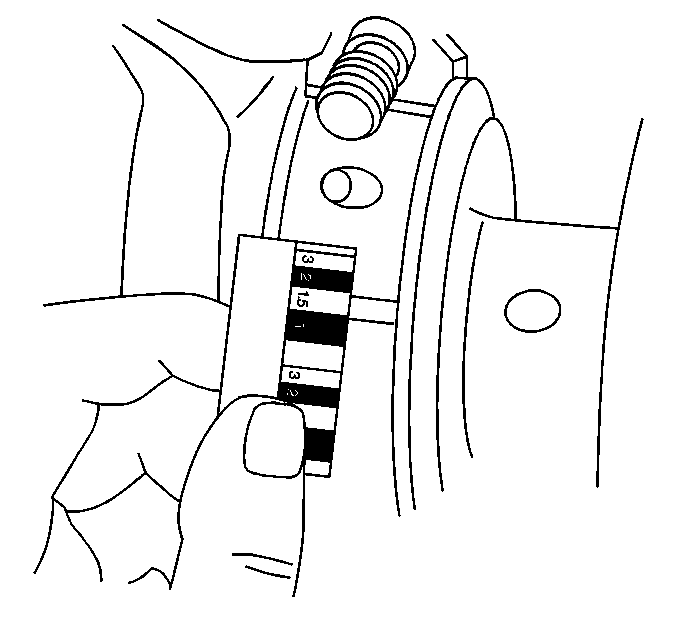
- Without removing the gauging plastic, measure the gauging plastic compressed
width at the widest point. Use the graduated scale on the edge of the gauging
plastic envelope .
- Clearances for crankshaft bearing numbers one, two, three, and
four are 0.045-0.083 mm (0.0018-0.0033 in).
- Clearances for crankshaft bearing number five are 0.055-0.093 mm
(0.0022-0.0037 in).
- If the flattened gauging plastic tapers toward the middle or ends,
there is a difference in clearance indicating taper, out-of-round, low spot,
or other irregularity of the bearing or journal. Replace the crankshaft if
the journal taper or out-of-round exceeds 0.025 mm (0.001 in).
- If the bearing clearance is not within specifications, replace
the bearing. Always replace both upper and lower bearing inserts as a set.
- If a bearing is being fitted to an out-of-round journal, be sure
to fit to the maximum diameter of the journal. If the bearing is fitted to
the minimum diameter, interference between the bearing and the journal will
result in rapid bearing failure.
- A standard or undersize bearing combination may result in the
proper clearance. If the proper bearing clearance cannot be achieved using
standard or undersize bearings, replace the crankshaft.
- Remove the flattened gauging plastic.






